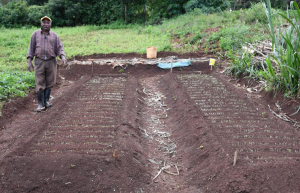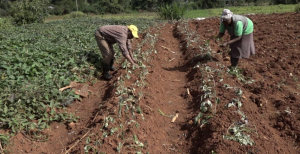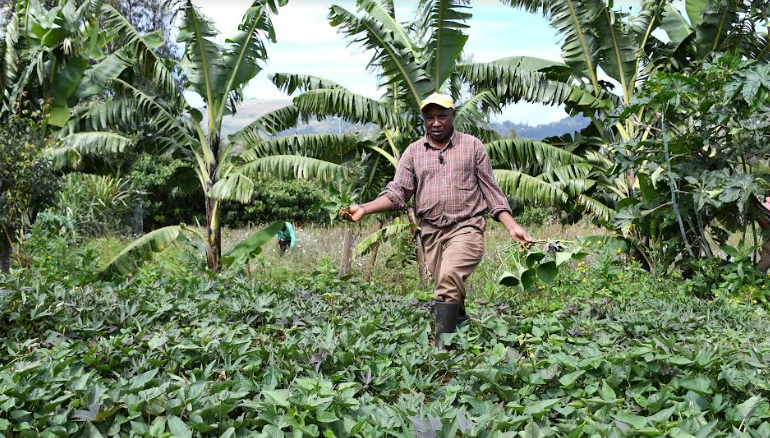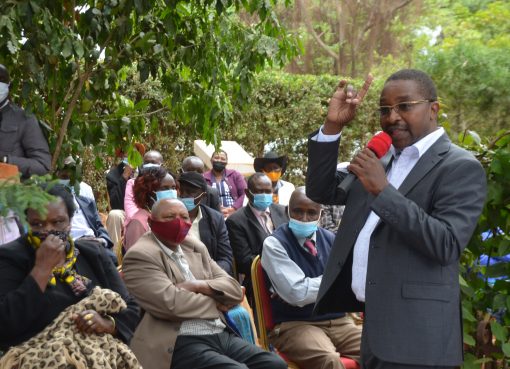Fredrick Gitau has fond memories of small-scale farming from his childhood. He and his seven siblings were educated through the proceeds from the sale of tomatoes.
His family used to earn some money every three months. He recalls how his father was a well-known tomato farmer in Subukia, Nakuru County.
Having witnessed firsthand how lucrative tomato cultivation was in the 1980s, it was easy for Gitau to be enticed to delve into that wing of horticulture. His dream was to be as successful as his father was.

“Tomatoes were among my first crops when I began farming,” he says. Upon trying his hand at growing tomatoes, his high hopes appeared to be dashed. He abandoned the crop.
“Tuta Absoluta emerged,” he says. “I didn’t possess knowledge regarding the pest.”
The pest is destructive. It’s a leaf miner. It wreaked havoc on his crop.
His wife, Gladys Wangui, frets, recalling that pest. “If Tuta attacks your tomatoes, you will be finished. There’s nothing you’d harvest,” she says.
The couple incurred significant losses sometime in 2019, due to the insidious devastation by the pest. It was a complete crop failure for them. They never imagined at the time that there could be potential solutions to the menace other than chemical spraying.
Gitau laments that the farm inputs he had invested in went down the drain. “The following year, I didn’t grow tomatoes,” he says. “I switched to cabbages.” What he anticipated didn’t come to pass. “The prices were low. Earnings were poor.”
The following season, having been enlightened on how to combat Tuta Absoluta, “I sowed tomatoes again,” he says. Another adversity hit him. Drought set in. “Tomatoes require a lot of water. If they lack water for a week, they wither. Reviving them is a daunting task.”
“I dropped tomatoes and returned to cabbages,” he says. The difference in farm inputs for the two crops caught his eye. “For tomatoes, it’s higher: seeds, pesticides, and labour.”
Gitau hasn’t forgotten how well-paying tomatoes can be. “I know how to grow them in a greenhouse,” he says. “But I lack the resources to do so. If you have a greenhouse, whether or not there’s El Nino, you would go on.”

Meanwhile, Gitau’s family has partly sought solace in mixed farming (watch video). Their one-and-a-half-acre farm hardly rests. A variety of sweet potatoes—yellow, white, and pink-fleshed for human consumption, and another kind for animal feed—dot their farm. Other crops are Irish potatoes, French beans, maize, and beans.
Pyrethrum, which is slowly creeping back to the region, also has some space here. The Gitaus practice crop rotation.
Gitau often works side by side with his wife, Wangui, on their farm in the Milimani area. They have recently been transplanting sweet potato twigs.
“I have been growing these varieties to gauge which one is the most ideal for my soils,” says the father of five. “I used to grow the ordinary kind that was characteristic of this area.”
The family has already harvested the yellow-fleshed potatoes once and consumed them. Gitau believes these potatoes are sweeter than the traditional ones.
The varieties mature within three months. Every twig of the sweet potatoes produces three or four tubers. “Some are quite big,” Gitau says.
He hopes to multiply the seed and supply it to other farmers in Subukia and beyond for propagation.
At the moment, the Gitaus have their Gloria cabbage variety in a seedbed waiting for transplanting. One sachet of 50 grammes of seed costs them Sh3,800.
“I grow only this kind,” Gitau says. He has two reasons: this type doesn’t get damaged even if there are torrential rains. Secondly, it remains fresh for several days after harvesting. For every sachet of Gloria seed, he earns between sh. 7,000 and sh. 8, 000.
“I sometimes buy the seedlings from farmers that grow them in greenhouses,” he says. “It costs Sh2.10 per seedling. So if I buy 10, 000, it would cost me a lot.”
“I grow French beans in stages,” he says. “When harvesting one batch, I would be growing others in other portions, including on hired farms.”
This family continuously reserves half an acre for the French beans. A seed company, Frigoken Limited, contracted the Gitaus to multiply the seed. The company provides them with the seed to sow. One 250-gramme packet of French beans produces 150 kgs. The family is paid per harvest.
While the Gitaus were reeling from the effects of having been smitten by Tuta Absoluta, a solution was being sought. Agricultural authorities, researchers, and non-governmental institutions have urgently been directing attention towards efforts to mitigate the impact of the pest.
The adult female moth lays eggs on the leaves of tomato crops. The eggs hatch into larvae. The leaves are chewed through. The larvae also feed on the fruit. Extensive damage arises. The quality and quantity of the crop drop.
Chemical pesticides, if poorly used, pose environmental and health risks to both farmers and consumers.
Ukulima True is a campaign implemented by the County Government of Nakuru in partnership with the Centre for Agriculture and Bioscience International (CABI) and the Centre for Behaviour Change and Communication Centre (CBCC). The campaign was being implemented in Subukia Sub-County from May to December 2023. Seeking to reduce the risk of pesticides to stakeholders in the food value chain was at the helm of the initiative.
Integrated Pest Management (IPM) approaches have been deployed on the farms of many farmers in Subukia. These entail a combination of cultural, biological, and chemical control methods to curb infestations.
One of the most effective strategies farmers in Subukia have employed is the use of pheromone traps. These traps emit synthetic chemicals that mimic the sex pheromones of the tomato leaf miner, attracting and trapping the male insects. The number of male insects is reduced. The breeding cycle of the pest is therefore disrupted.
When the Gitaus’ tomato cultivation resulted in total crop failure, they didn’t know how to biologically control the proliferation of the pest. “Now we do,” says Gitau. His wife adds, “If we were to resume tomato farming, we’d manage to combat the challenge.”
The CBCC Technical Director, Dr. Catherine Lengewa, says, “We came up with a social and behaviour change strategy for addressing the unsafe use of pesticides.”
She says that the Ukulima True campaign aims at “inciting others to be true farmers—one who’s conscious about the safety to themselves, the consumers, the soils, and the environment of the products and the chemicals they use.”
Apart from farmers, agro-dealers, extension officers, policymakers, and the community were targeted by the project.
“It’s the right for the consumer to get safe food,” says the Monitoring and Evaluation Officer at CBCC, Rodgers Kinoti.
After applying pesticides, some farmers would discharge the excess onto surfaces. Furthermore, the “disposal of pesticide containers after spraying wasn’t being done properly while farm re-entry wasn’t as it should be,” Kinoti says.
Michael Kahiro is a retired veterinary officer. For fungal or bacterial diseases in crops and ticks, fleas, and other ectoparasites in animals, he says, “We have to use the right chemical for the right crop or animal.”
Another strategy employed has been working with lead farmers, who would conduct peer-to-peer education within their groups.
“We had a total of over 30 lead farmers who had over 30 group members each,” Dr. Lengewa says. The project targeted 1000 farmers, and this figure was exceeded.
The CBCC Managing Director, Peter Lengewa, says that there have been misconceptions about using some pesticides safely. “In behaviour change, we look at three key aspects: knowledge, attitude, and practices,” he says.
There have been cases where some farmers duplicate crops and practice different pest control on the different portions. Crops for the market may be sold without observing the pre-harvest interval (PHI).
“Farmers are now saying we want to make the entire farm the same,” Lengewa says. “Safety is safety.”
If the biological traps (watch video) were 80–90 per cent effective, then the chemical spray required would be minimal. The Ukulima True project has been advocating for the training of young male spray service providers (SSPs). These SSPs, aged not more than 35, clad in their Personal Protective Equipment (PPEs), would be called upon to spray a farmer’s crops.
The battle against pests in the tomato fields of Subukia has bitten some farmers into a retreat. But now, with more than 1000 farmers armed with the IPM strategy, it’s hoped that the tide will swing in the farmers’ favour to ensure sustainable tomato farming in the region.
Farmers are being encouraged to conduct regular monitoring and scouting of their tomato and other crop fields. This is crucial for the early detection of pests. Proper remedial control measures would be applied.
The Tuta Absoluta pest is no longer the dreaded menace it’s been in the past. “I would like to resume the cultivation of tomatoes,” Gitau says. “They grow fast and have a market.”
By William Inganga





